Humanist EDge: Humanist Activism Takes Many Forms
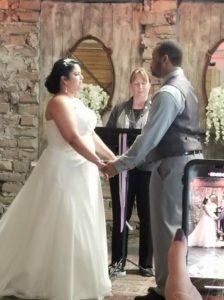 Tee Rogers serves as celebrant for the wedding of two BE. members
Tee Rogers serves as celebrant for the wedding of two BE. members Tee Rogers, founder of BE. Orlando and the humanist chaplain at the University of Central Florida, is an inspiring humanist activist dedicated to making a positive difference in the world in many ways. Here she shares a bit about the creative projects she manages and ways you can actively support humanism as you serve society.
Developing opportunities for humanist and atheist volunteers
BE. Orlando (the “BE.” in our name is a verb, not an acronym) was founded in 2011 and has since hosted 531 events and performed 5,212.75 hours of service. We are a gold level volunteer team with the Beyond Belief Network and an affiliate of both the American Humanist Association and American Atheists. We partner frequently with a local organization, the Central Florida Freethought Community.
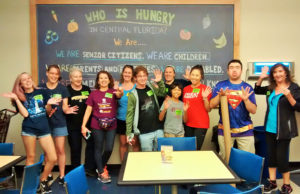
BE. volunteers at the Second Harvest Food Bank
The faith-biased (yes, the spelling of “biased” is intentional) organizations dominating the nonprofit sector can be—or seem—unfriendly and unwelcoming to atheist volunteers, donors, and even those seeking service. Someone may feel compelled to pretend to pray to another person’s god in order to feed their hungry children. Someone else may hesitate before leaving a violent relationship and seeking safe shelter because they fear further victimization and proselytization there. Regarding volunteering and donating, we get many inquiries seeking secular-friendly charities where people can invest their time and resources. Secular people want to know their contributions will support the need being addressed—hunger, homelessness, pet rescue, environmental work, etc.—not further a religious agenda.
BE. Orlando provides a safe space where we can openly volunteer as a non-religious organization to help overcome negative stereotypes. That message of respect for all is important to many people of faith as well. BE. has quite a few religious members who share our belief that kindness and compassion are ubiquitous human potentials—we can be good without a god. Serving together builds bridges across our differences, opens hearts, and changes minds. The real focus for each volunteer project is the actual work we’re doing to make a difference in our community, but there is always the added impact of normalizing inclusion for secular Americans. When we volunteer together as an organization, our members can feel safe, represented, and respected. They know BE. will work with the agency to address any issues that occur and together we can break down barriers that prevent non-religious people from volunteering, donating, or seeking help.
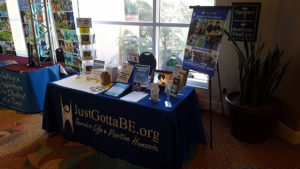
The BE. table at the Florida Faith Symposium
BE. members make a difference in many ways. Upcoming events include serving meals at a domestic violence shelter, at homeless shelters, and at Ronald McDonald House; joining in environmental projects like mattress recycling and invasive species or trash removal; and helping at the local LGBTQ+ youth center. We plan annual events like “Math, Science, and Pi(e) Day” with at-risk youth. We promote collaborative secular community blood drives, book and toy drives, and other needs-based collections. We also go to local festivals where we host a humanist outreach tent, a service project, and a blood drive. Last year we even hosted an atheist table at the Florida Faith Symposium.
Here are a few sites we host to support the secular community:
- http://JustGottaBE.org – BE. Orlando’s main page and blog
- http://positivepostcardproject.wordpress.com – a DIY secular on-site service project
- http://seculargratitutde.wordpress.com – a repository of secular graces, reflections, and prayers
- http://stem4youth.wordpress.com – a central place for information on collaborative philanthropic efforts of local secular groups such as STEM-themed book and toy drives
- http://humanistcalendar.wordpress.com – a collection (currently under construction) of special days meaningful to the secular community
Supporting non-religious and underrepresented faith minorities on campus
I’ve worked full-time at the University of Central Florida (UCF) since 2004 as a special projects coordinator, and I became more involved in the greater campus community through volunteer roles such as the chair of UCF blood drives and staff advisor for two student organizations, the Secular Student Alliance and Habitat for Humanity.
I learned about the national Secular Safe Zone in 2013 and began exploring how we might bring that to UCF. Months of focus groups helped develop a workshop titled “InterWorldview Respect and Inclusion” to bring faith and non-faith into the diversity conversation at the university and to establish a Secular Safe Zone network. It was clear there was a need to address discrimination and other challenges—such as bullying, proselytizing, and harassment—that non-religious and faith identities were experiencing on our campus. Advocacy resulted in meaningful progress thanks to the genuine culture of inclusion at UCF. For example, non-religion is now listed as a protected class in our non-discrimination documents (passed by the Board of Trustees, in October 2017). The university’s webpage for inner-life and spiritual support has been updated to include resources for students of all faith and non-faith perspectives.
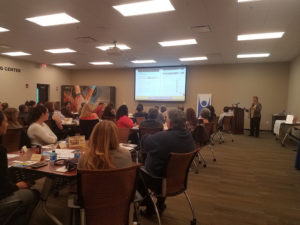
Attendees at the UCF Secular Advocacy Dinner
There is now a humanist peer support group, which is part of the national Recovering from Religion network, and a scholarship award fund at UCF for secular students who engage in volunteerism. In response to a high level of curiosity and desire for further discussion about non-religious identities, a second workshop, “Humanism: The Experience of Living without God,” launched last year.
Today, all of the program components—workshops, allies network, peer support group, etc.— at UCF fall under the banner of Humanist and Secular Services. Next paths on the journey may include establishing a humanist faculty and staff association and piloting an InterWorldview Expo where students, faculty, and staff of all perspectives can connect with inner-life support and campus resources.
At the heart of Humanist and Secular Services at UCF is interdependence and connection to other university resources and guidance of other leaders; advocacy and representation for secular students; and commitment to supporting non-religious and underrepresented faith minorities on our campus and in the community. My hope is that this effort uplifts and empowers others and—in some small way—makes the world a safer, kinder place for atheists and everyone else.
Making time for self-care while managing various projects/positions
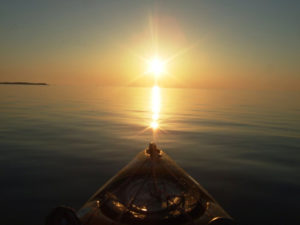
Watching the sunrise at Cedar Key
When your work comes from the heart and you love what you do, it doesn’t feel like work. Nonetheless, we all have to re-charge. I care for a community of dwarf aquatic frogs and several wild anoles who hang out in my indoor garden. I also often make time to watch the sunrise. It’s the best time of day: the playful morning bats’ erratic dance against the background of stars winking out; the night chorus-hum blending into the cacophonic symphony of the birds at first light (always started by one inspiring rebel voice); the dynamic colors blending across the sky and how, as the light increases, the diversity of greens and other colors emerges; the entertaining bird politics at the feeder (my “twitter feed”); dewy webs strewn with sun sparkles in the first light; and the one star that lingers long after the others are gone.
